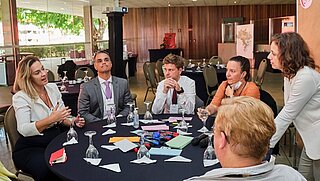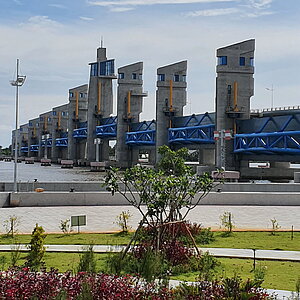More than a step forward

How the IKI supports Brazil’s Sustainability Agenda and risk assessments in transportation infrastructure.
People are smiling, shaking hands, some are hugging each other. After two years, colleagues from different Brazilian federal ministries and other government agencies meet with their counterparts during the IKI Interface workshop in Brasilia. For some it is just another setting to reflect on the results and achievements of a long working relationship. Others seize the opportunity to meet in person for the first time after longer periods of online meetings only.
The latter is also true for Larissa Amorim, the Head of Department for Sustainability at the Ministry of Infrastructure (MInfra). But Larissa and her colleagues José Neto and Uria Cavalcante Oliveira from the Brazilian National Waterway Transportation Agency (ANTAQ) not only liaise with other Brazilian and international colleagues from IKI projects to reflect on implementation results achieved so far. Rather, both colleagues are already ahead of the results and would like to take more than just the next step forward!
The idea for this step ahead: Large up-scaling of climate risk assessments for Brazil’s transportation infrastructure
Beyond the collaboration with the Ministry of Environment (MMA), the two IKI projects ProAdapta and Climate Services for Infrastructure Investments (CSI) had started to involve sectors with larger demands for adaptation, the awareness to apply climate risk assessments and use necessary climate information services. For the last four years, the group of stakeholders has grown substantially and now also includes the Ministry of Infrastructure, the Ministry of Science and Technology and Innovation (MCTI) and actors at state level such as INPE as the main climate information service provider.
After three pilot climate risk assessments in the state of Santa Catarina with the state’s main energy provider Eletrosul and Brazil’s second largest port (Itajaí), the two IKI projects were asked to support ANTAQ and MInfra in adjusting the PIEVC risk assessment method to be used for the entire port asset portfolio along Brazil’s coastline. In November 2021, ANTAQ presented the results of “Impacts and risks of climate change to Brazilian coastal public ports” showing the risks for 21 ports for 3 main climate hazards: strong winds, thunderstorms and sea level rise. One of the results of this assessment has been a risk ranking of all ports classified according to risk level, considering the present risk and projections for 2030 and 2050.
Climate risk analysis within the transport sector
Compared with the previous detailed risk assessment of the port of Itajaí in 2018 and 2019, this PIEVC Portfolio Screening of ANTAQ’s coastal harbour assets has been initiated to better prioritise further needed and more detailed analysis of individual ports. Based not only on the demand from MInfra and ANTAQ in Brazil, but also from different public infrastructure owners in different countries, this approach is meant to save time and financial resources to ensure a quicker overview of entire infrastructure portfolios and only engage in more detailed, lengthy and thus costly risk assessments where needed. Of the 21 ports in Brazil, three ports have been finally selected for a more detailed analysis in 2022: the port of Aratu/BA, the port of Rio Grande/RS and the port of Santos/SP, which is the busiest container port in South America and the second busiest in the southern hemisphere. The prioritisation has considered not only the highest climate risks for the three ports, but also the regional characteristics of each one, e.g. the prospect of new investments materialised in qualified leases in Brazil’s Investment Partnership Program(PPI).
In cooperation with MCTI, results from the portfolio screening assessment have been also incorporated into the AdaptaBrasil platform. This digital tool was launched in May 2022, offering information on climate change and impact analysis for important public sectors such as the energy sector as well as the food and water industries. With the support of the two IKI projects, the results from the seaport assessment with ANTAQ are now online and accessible to the public.
The PIEVC portfolio assessment has also been a great opportunity for these port authorities to exchange experiences on managing climate risks. In December, a webinar was held to exchange ideas on specific adaptation measures for the port sector:
Brazil stays focused on the green recovery after the challenges caused by the COVID-19 pandemic
With the launch of the Sustainability Guidelines in 2020 and the Agenda for Sustainability, the Ministry of Infrastructure has the objective to widen the scope of socio-environmental management for all modes of transport in Brazil.
This is where Larissa Amorim and Jose Neto’s next bigger step ahead comes into play, as not only the port sector is to be adapted to climate change. Until the end of 2022, MInfra and the IKI projects ProAdapta and CSI are working to scale up the portfolio risk assessment and apply it to the Brazilian government’s AdaptaVias project, which is the assessment of impacts and risks of climate variability and changes in all land transportation. All federal highways and railways are being considered in the approach. In her function as Head of Department for Sustainability at MInfra, Larissa Amorim is working closely with other secretaries within the ministry to integrate these upcoming results into other projects such as the public-private highway concession process.
MInfra even intends to go further and would like to replicate the portfolio screening methodology to also analyse Brazil’s airports and waterways (river ports) over the next years in accordance with the new Sustainability Agenda 2023-2026.
The link has been copied to the clipboard
Contact
IKI Office
Zukunft – Umwelt – Gesellschaft (ZUG) gGmbH
Stresemannstraße 69-71
10963 Berlin
Further information
PIEVC stands for Public Infrastructure Engineering Vulnerability Committee, an assessment protocol that originated in Canada.
Link to PIEVC Large Portfolio Risk Assessment
RCP stands for Representative Concentration Pathway, the projection of greenhouse gas emissions in the atmosphere. Among different scenarios, RCP 8.5 projects the highest concentration.



















